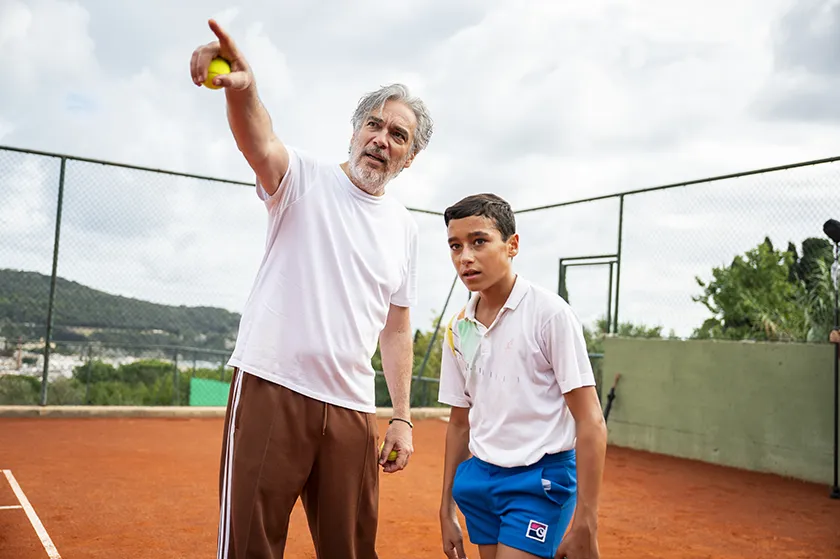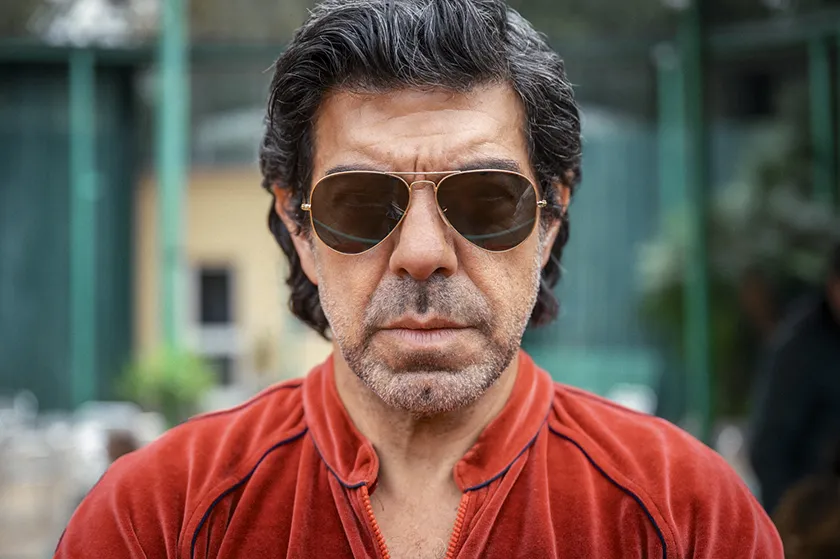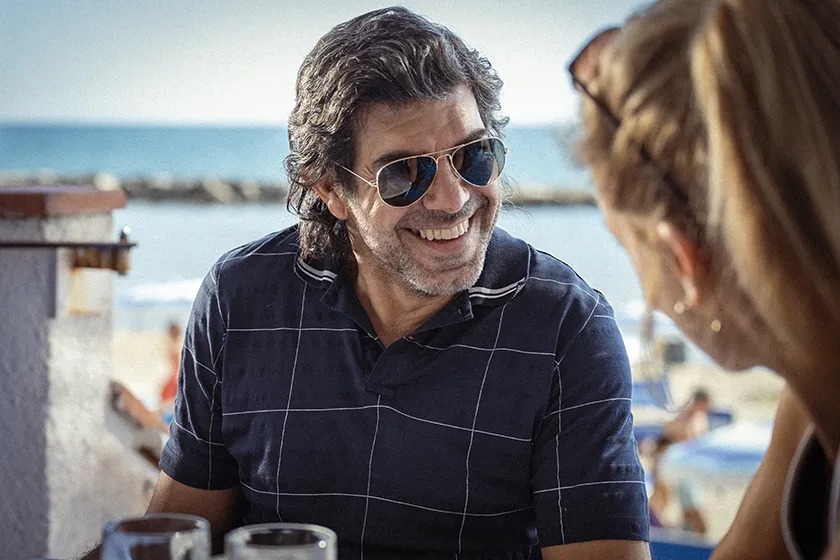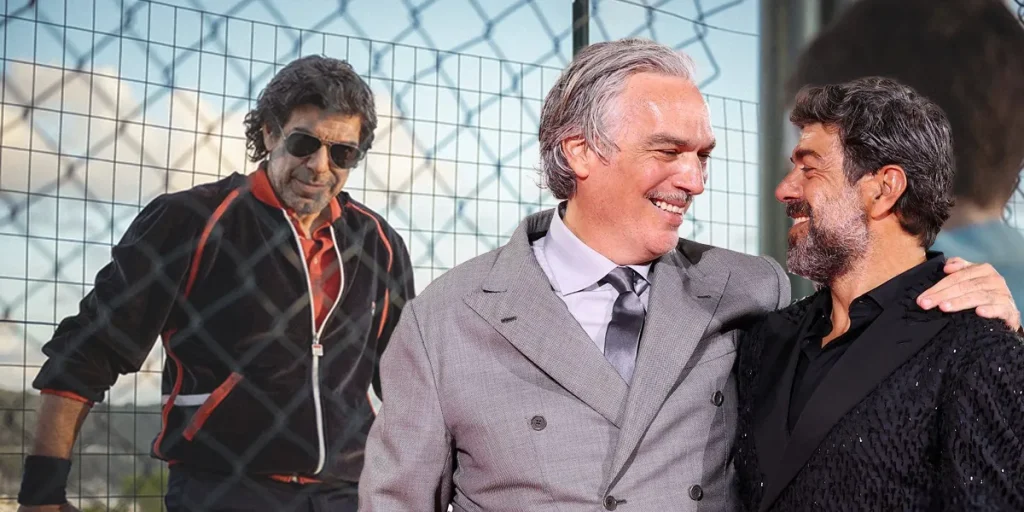At the Venice Film Festival, we interview director Andrea Di Stefano and star Pierfrancesco Favino about tennis drama My Tennis Maestro (Il Maestro).
It’s the late 1980s, and the protagonist of Andrea Di Stefano’s My Tennis Maestro (Il Maestro), thirteen-year-old Felice (Tiziano Menichelli) – a name that literally translates to “Happy” – is about to have the summer of his life. Felice’s dreams are much bigger than his peers’, as he’s a tennis athlete, and he’s about to start competing in national tournaments. So while his friends and family are getting ready to go on holiday, he’s preparing to train as hard as he can, following to his slightly obsessive father’s (Giovanni Ludeno’s Pietro) teachings. Or so they both think.
Pietro has trained his son to not only follow a certain food regimen and a strict workout routine, but also recognise signals his dad would send him while he’s playing, which he’d execute accordingly in order to beat his adversaries. Though Pietro feels like he’s molded his son into the perfect player, he recognises that he needs to hire a professional to take him to national tournaments. Enter Raul Gatti (Pierfrancesco Favino), a former champion who’s appeared 16 times at the Foro Italico, Rome’s Tennis Master.
And so, Felice and Raul set off on a trip along the Italian coast, the former with hopes of winning big and the latter in it for the money, and possibly a sense of purpose. But as both characters get to know each other and eventually come to face their deepest fears and desires, they’ll ultimately get something that’s worth a lot more: freedom, and a sense of self.
Pierfrancesco Favino and Tiziano Menichelli are superb in a film that starts as the coming-of-age tale of a gifted young athlete finding himself and turns out to be so much more. My Tennis Maestro (Il Maestro) looks at the pressure of competitive sports and what role that kind of environment plays into shaping one’s identity, but it’s also an exploration of family dynamics, our society’s obsession with happiness, and ultimately, the life’s imperfections. It will defy your expectations more then once, balancing action and comedy with poetry and vulnerability.
At the 2025 Venice Film Festival, where My Tennis Maestro had its World Premiere, we sat down for an interview with director Andrea Di Stefano (also the film’s co-writer with Ludovica Rampoldi) and star Pierfrancesco Favino. Here’s what they told us about the film’s origins and themes, tennis, the importance of failure, a protagonist that doesn’t change, acting and directing, and more.
Andrea Di Stefano & Pierfrancesco Favino About the Film’s Origins and Tennis
What made you want to tell this story, Andrea?
Andrea Di Stefano: I was the little kid [that you see in the film]. I was a young tennis player whose father was a trainer, so I was trying to do justice for something that happened to me. Back then, I met this tennis coach who wasn’t a perfect man: he was a bit all over the place, but he taught me something that I carried on in life, which is very precious. He probably wasn’t even aware of it, but I’m really grateful to this man.

Pierfrancesco, you’re a fan of tennis, aren’t you? Do you play it as well?
Pierfrancesco Favino: I used to play tennis when I was a kid. I love watching it now. Of course, I’m a big fan, especially now: it’s easier to be big fans of tennis in Italy now! But I’ve always followed tennis: I like it, I think it’s a marvelous game and a great sport. It’s very tough to play tennis at the level of these guys [who play it professionally, like those portrayed in the film], especially because you’re really alone.
That’s part of the story we’re telling. I don’t know how they can do it, because the pressure is so high, and I don’t know if I could stand it, honestly. I like to play sports that we all play together, because you can always blame somebody, you know? [laughs] You can always say, “I didn’t succeed because of him”, or because of that reason, or because of the conditions around you. But when you’re there, you can’t do that. It’s true what we say when we say, ‘you play it alone’. You are the only one to blame if things are not working. That’s a great thing, but it’s also terrifying.
How My Tennis Maestro Comments on Our Society’s Obsession with Happiness
Andrea, the film starts with the sentence, “La vita mi sorride” (“Life is smiling to me”), which someone suggests the coach should tell himself whenever he needs motivation. Your protagonist’s name is Felice, which means Happy, so it comes with responsibilities. The coach, Raul, often says “Come se la gode Raul Gatti, non se la gode nessuno” (“Raul Gatti enjoys life the way nobody else does”) about himself. And it all leads up to a scene towards the end where somebody asks Raul, “Are you happy?”.
It really made me think about our society’s obsession with us having to be happy at all times.
Andrea Di Stefano: Yeah, that was a big part of our discussion and objective. Nowadays, with social media, we all present the most ‘heroic’ part of ourselves: the best pictures, taken in the best places. “I’m here. Look who I’m with, and what I’m doing”. Everybody feels like the best part of themselves. I think that with sports, and especially with tennis, where you’re alone in a tennis court, there is no compromise. You either win, or you lose. Today, there are a lot of people who are hiding, and it’s not beneficial to them, especially kids the age of the young protagonist. But in the ’80s, you couldn’t hide. So I thought that it could be refreshing just to give this perspective on the the way the world has always been, except for these past 15 years.
And then, we also wanted to hear this coach’s heartbeat, and his struggles, and feel for him. When somebody asks him, “Are you happy?,” the audience thinks, “Just tell everybody! Tell them: admit to everybody that your life is just miserable, and it’s been sh*t since you left [a love interest].
I love seeing movies where the character says something that’s the complete opposite of what what he feels. And the way [Pierfrancesco] acted it out [in that scene, with his response to that question] works really well.
It’s an amazing scene, and it’s an amazing performance. That’s the best scene of the film for me.
Pierfrancesco Favino: Thank you!
A.D.S.: Yeah. He pulls out that sentence, I don’t know where from, but it’s really powerful.
“You can live a life even if you’re not good at it” – Pierfrancesco Favino on Winning, Losing, and Being Who We Are in My Tennis Maestro
There’s this very interesting balance between Raul’s relationship with Felice and all these other emotions he carries within him. Pierfrancesco, can you talk a little bit about how you found that balance?
Pierfrancesco Favino: I think that there are some things [in Raul Gatti] that resonate with me. When Andrea told me about the story for the first time, I didn’t really get what it was about, emotionally. But then, that was a moment in my life – and it’s still going on – where certain things are coming to a point, creatively. This is the most defeated character I’ve played, and that gave me the opportunity to show some other nuances in terms of emotions. I really felt for him, but I didn’t want to save him.
Usually, when you play a character, you’re his lawyer. I’ve been playing so many gangsters or bad guys, or politicians. In the end, in the back of my mind, there was always this temptation that wanted people to to save them. But this is not the guy who needs to be saved: there’s nothing to save about him. He’s just somebody who makes so many mistakes, as we all do in the end, and whom you might even think is an irresponsible piece of sh*t. Why not? If you really want this story to say what we’re saying, you have to let him go [at the end of the film] with all of all of his problems [still there].

That was, I think, the balance, because, of course, he has to be over the top sometimes. It can’t go too low, because if he goes there, there’s hell: he’s a bipolar character, and he’s on medication. He’s a dangerous guy. But in a way, it’s bigger than life. [The reality of things is that] what this guy thinks is wrong, and it’s exactly the opposite: he doesn’t have anything to teach this little boy, apart from the fact that you can live a life even if you’re not good at it. I think this is what we all should be reminded of, especially now.
We were talking about the fact that [according to society,] we should all be happy and good-looking. For example, we’re having a holiday in a fantastic place. Then there’s a picture [on social media] of somebody who’s in a better place than you are. I watch my kids with their phone, saying, “Oh, my friends are all there.” It’s always another place, and it’s never the place you’re in. That gives you the feeling that you’re always in the wrong place, because there’s always something better. All the luxury and beauty you see in a picture is always better, with all the filters you can put on it. I think that this is something that we should all be reminded of.
Did you go to your own experiences at all for this role?
P.F.: I think there’s something about the fact that I’ve started to allow myself failure. For example, to say, “Okay, it didn’t go as expected.” It happens; It doesn’t mean that you’re wrong, or that you’re not a decent actor. You can’t nail it every time: it would be so boring. [I’ve recently realised that] in my career, I’ve always been trying to nail it. But where’s the humanity in this?
Andrea gave me the opportunity to play a character who, in the end, allows himself to be just what he is. As an actor, I think that this is something that teaches me a lot. You never know when you “nailed” it, because it’s not about your feelings; it’s about the feelings of the people who are watching you. Maybe you could have done something better, and maybe next time you will, because there’s going to be another opportunity. Maybe it’s not that interesting, or maybe it’s not that important, you know? In a way, looking at this character, you can go back home and say, “Okay, we can make it somehow.”
It’s a particularly interesting theme in a film about a competitive sport.
P.F.: Yeah. And another very interesting thing is that I think he’s afraid of winning. He’s always been there to win something, be it in life or in sports. But whenever he had the chance to win, he always found a way to escape. The whole world is telling us, “You have to win, you have to win, you have to win.” But winning can be scary, and it can be difficult. Not everybody is able to handle the responsibility you might have if you do win. Because if you win, then you’re alone. When you’re on a podium and you’re number 1, the wind is high, and it’s blowing. If you’re number 2, somebody’s covering you from that wind. If you’re number 3, two people are.
But if you’re number one, you’re alone, and everybody wants you to go down from that podium. Some people have the ambition, the ability, and the talent to be on that podium, but others don’t, and that’s okay.
Andrea Di Stefano on Change, Religion and Redemption in My Tennis Maestro
There’s a scene that takes place in a hospital chapel, and especially one involving a crucifix, that I don’t want to spoil for our readers, but I thought it was very interesting that you added religion to the mix, particularly in the way that scene plays out for Raul Gatti.
Andrea Di Stefano: Raul is a character who doesn’t change until the end. Every time we open a door that [gives him the possibility to change], he doesn’t. There’s a moment where Raul goes to the hospital, and the kid [Felice] goes into the chapel and finds him praying. In that scene, I imagined the audience to have been like, “Oh my God, he’s changing. He’s a new man now.” We keep thinking about it until the very end of that scene, because Pierfrancesco is so good at playing it like that.
But then, right after he’s had one of the biggest cries in his life, he still finds a way to f*ck around with the kid, because he’s never going to change. My Catholic temptation was to give him redemption, but I forced myself not to do it, and it came natural. It was an opportunity we gave [the character] to prove that he’s not going to change.
Andrea Di Stefano and Pierfrancesco Favino on Acting and Directing
Do you think your experience as an actor influenced the way you direct at all?
Andrea Di Stefano: I was very, very lucky to have started theatre when I was young. I was very shy, but as soon as I got inside a theatre, I knew I had found my place, even though I didn’t yet know what it was. I started acting and working very early, after I got this scholarship to go to New York. The Actors Studio had just been renewed by Paul Newman, and I acted in one of its first plays: I was the young protagonist of “Maxim Gorky,” directed and produced by Arthur Penn. I didn’t really have any cinema or theatre culture; I was just somebody who had found themselves there and was basically just saying lines, with no experience.
And so I found myself having extremely complex conversations about character structure with extremely talented people. I had the opportunity to look into somebody’s eyes and ask questions about human beings. I didn’t have a passion for cinema, back then; I didn’t have any references [in the industry]. One day, everybody laughed at me when they were talking about Marlon Brando in A Streetcar Named Desire, and I had never seen the film. I didn’t even know Marlon Brando was at the Actors Studio! I felt so ashamed.
But then, that was also what made me so lucky; I wasn’t a fan of cinema, but I became one when I went to see Bicycle Thieves in New York. And I said, “Oh!” [in wonder]. “That’s how they do character structure in Italian movies!” I knew what that was like in theatre, but this was like a Rubik’s Cube to me. I started looking at movies not as a fan, but as a technician, looking at where acts would end, how characters were given conflict, and so on.
It was like a very enjoyable game to me. I was really able to understand the ins and outs of storytelling, and that’s when I fell in love with directors. For ten more years, I was still an actor, but I started fixing scripts of other people. And then I decided to [make films] myself. So in a way, those first ten years as an actor prepared me to become a director.

Pierfrancesco Favino: For us [actors], and for me, knowing that he’s a director helps so much. When you know that your director has always been an actor, and he knows what you’re going through when you’re in front of a camera, as a human being, and which problems you might be having… You know that he knows what you’re going through in that moment. You can go there without feeling ashamed if you’re not nailing it or you’re not doing what he wanted. He knows that it’s not out of ‘strange thoughts’ that you’re having; It’s just due to the fact that something’s not working, and you need to find another way of getting there. But knowing that he had that experience, for me, was very important.
What do you think acting gives you, Pierfrancesco?
P.F.: It gives you adrenaline; there’s no doubt about that. When you’re in front of the camera and you hear action, something happens. It’s like you’re living life 100% in that moment. With all the frustration, all the difficulties, and all of the problems it may give you, that moment is still something that makes you feel alive. It can be stressful; it’s always stressful. But I like to be challenged, and I think I like human beings very much. I’m very interested in how we work, and how we function. We are very interesting animals, and I like investigating our behavior.
What do we want? What do we need forgiving for? Putting yourself into somebody else’s shoes is to become more empathetic towards the rest of the world; I think that everybody should be taking acting classes in primary schools. We’d have a much more peaceful world if it were like that, because we’d immediately start listening to one another. The more you have the opportunity to put yourself in somebody else’s shoes, the more your tendency to judge other people comes to an end.
Thank you both so much for speaking with us!
This interview was edited for length and clarity.
My Tennis Maestro (Il Maestro) had its World Premiere at the Venice Film Festival on August 31, 2025. The film will be released in Italian cinemas on November 13.
Header credits: Pierfrancesco Favino in a still from the movie (Andrea Miconi / Courtesy of La Biennale di Venezia) / Director Andrea Di Stefano and Pierfrancesco Favino at the premiere of the “Il Maestro” (My Tennis Maestro) at the 82nd Venice International Film Festival on August 31, 2025 (Photo by Gisela Schober / Getty Images)

